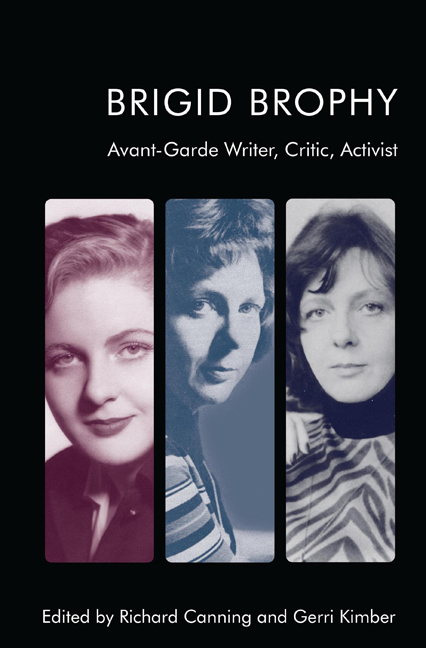Book contents
- Frontmatter
- Contents
- List of Illustrations
- Acknowledgements
- Introduction
- 1 Embodying the Fragments: A Refl ection on the Reluctant Auto-Biography of Brigid Brophy
- 2 Brigid Brophy’s Paradoxical World of Childhood
- 3 Intr oduction to ‘The Librarian and the Novel’
- 4 The Librarian and the Novel: A Writer’s View
- 5 Penetrating (the) Prancing Novelist
- 6 ‘Shavian that she was’
- 7 ‘Il faut que je vive’: Brigid Brophy and Animal Rights
- 8 Brigid Brophy’s Phenomenology of Sex in Flesh and The Snow Ball
- 9 Letter to Brigid
- 10 Encoding Love: Hidden Correspondence in the Fiction of Brigid Brophy and Iris Murdoch
- 11 ‘Heads and Boxes’: A Prop Art Exhibition Collaboration by Brigid Brophy and Maureen Duffy
- 12 Prancing Novelist and Black and White: Experiments in Biography
- 13 ‘Mo nster Cupid’: Brophy, Camp and The Snow Ball
- 14 ‘A Felicitous Day for Fish’
- 15 The Dissenting Feminist
- 16 A Certain Detachment?
- Notes on Contributors
- Index
12 - Prancing Novelist and Black and White: Experiments in Biography
Published online by Cambridge University Press: 17 October 2020
- Frontmatter
- Contents
- List of Illustrations
- Acknowledgements
- Introduction
- 1 Embodying the Fragments: A Refl ection on the Reluctant Auto-Biography of Brigid Brophy
- 2 Brigid Brophy’s Paradoxical World of Childhood
- 3 Intr oduction to ‘The Librarian and the Novel’
- 4 The Librarian and the Novel: A Writer’s View
- 5 Penetrating (the) Prancing Novelist
- 6 ‘Shavian that she was’
- 7 ‘Il faut que je vive’: Brigid Brophy and Animal Rights
- 8 Brigid Brophy’s Phenomenology of Sex in Flesh and The Snow Ball
- 9 Letter to Brigid
- 10 Encoding Love: Hidden Correspondence in the Fiction of Brigid Brophy and Iris Murdoch
- 11 ‘Heads and Boxes’: A Prop Art Exhibition Collaboration by Brigid Brophy and Maureen Duffy
- 12 Prancing Novelist and Black and White: Experiments in Biography
- 13 ‘Mo nster Cupid’: Brophy, Camp and The Snow Ball
- 14 ‘A Felicitous Day for Fish’
- 15 The Dissenting Feminist
- 16 A Certain Detachment?
- Notes on Contributors
- Index
Summary
Ronald Firbank, Aubrey Beardsley and Wolfgang Amadeus Mozart provided Brigid Brophy, who described herself as ‘a natural, logical and happy atheist’, with an alternative Trinity. These three shortlived geniuses are the presiding deities in Brophy's writing: they not only became the subjects of several essays and four works of non-fiction, but are palpable presences in other books. Brophy had started her career as a writer of fiction in 1953, and her earliest work of non-fiction, Mozart the Dramatist, was not published until 1964, the same year as her fifth (and most consciously Mozartian) novel, The Snow Ball, in which several people attending an eighteenth-century-themed fancy-dress party adopt the guises (and behaviour) of characters from Don Giovanni. A similarly fruitful exchange between fiction and non-fiction occurred in the case of Firbank, whose The New Rythum and other pieces she reviewed in the London Magazine in October 1962. This article was complemented, as it were, by The Finishing Touch, which was published the following year. This novel was described by Brophy as being written ‘in a superficially Firbankian idiom’, but it in fact pays homage to Firbank in its subject matter and its many allusions quite as much as in its language and style.
One of the things that characterises Brophy as a writer is this sense that her work is all of a piece, even though the books themselves are very different in form and genre. It seems clear that she was thinking of her own career when she wrote of a novelist in her other more than superficially Firbankian novel, Palace without Chairs (1978), that he developed
a technique for dealing with his imagination when it, uninvited, proffered nuclei of fictions: a few he compressed into short stories, which took a day or two to imagine and write down, but most, even more cleverly, he distorted into sometimes rather brilliant critical perceptions about other writers’ work.
As a biographer, Brophy was as keen as anyone to hunt down facts and turn up hitherto unseen documents, but it is her unusual approach to her subjects, and the brilliant critical perceptions that result from her research, that make her studies of Aubrey Beardsley and Ronald Firbank so outstanding and unusual.
- Type
- Chapter
- Information
- Brigid BrophyAvant-Garde Writer, Critic, Activist, pp. 182 - 192Publisher: Edinburgh University PressPrint publication year: 2020



